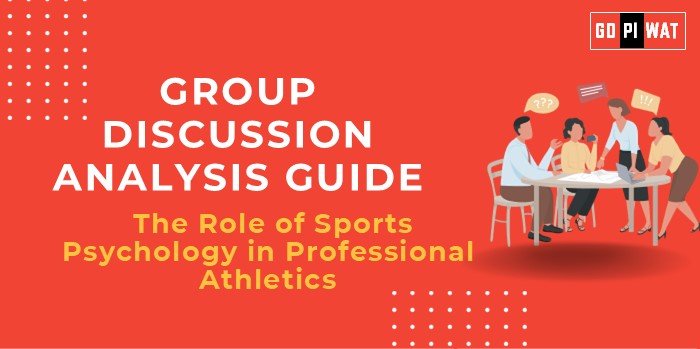📋 Group Discussion (GD) Analysis Guide: The Role of Sports Psychology in Professional Athletics
🌐 Introduction to the Role of Sports Psychology
Opening Context: In the high-stakes world of professional athletics, mental strength is as critical as physical ability. Sports psychology bridges the gap by focusing on improving mental resilience and performance under pressure.
Topic Background: Sports psychology emerged as a specialized field in the mid-20th century, gaining prominence as teams recognized the importance of mental conditioning. Today, it influences training, injury recovery, and team dynamics globally.
📊 Quick Facts and Key Statistics
- Performance Impact: Athletes utilizing mental conditioning show a 20% improvement in clutch performance (American Psychological Association, 2023).
- Adoption Rate: Over 90% of Olympic teams now employ sports psychologists (IOC Report, 2022).
- Injury Recovery: Mental strategies reduce recovery times by up to 25% (Sports Medicine Journal, 2023).
- Market Growth: Sports psychology services are growing at 8.6% annually, indicating increased reliance by athletes and teams (Market Research Future, 2023).
🔑 Stakeholders and Their Roles
- Athletes: The primary beneficiaries, enhancing focus, resilience, and recovery.
- Sports Psychologists: Experts guiding athletes through mental conditioning.
- Coaches: Integrating psychological strategies into training regimens.
- Organizations: Funding mental wellness programs to boost team performance.
- Fans and Media: Shaping athletes’ mental states through expectations and critiques.
🏆 Achievements and Challenges
🎯 Achievements
- Enhanced Mental Resilience: Athletes like Michael Phelps credit mental strategies for Olympic success.
- Team Cohesion: Psychological training has improved communication within teams like FC Barcelona.
- Injury Recovery: Serena Williams used mental techniques for her comeback post-injury.
- Youth Programs: Early mental conditioning initiatives promote long-term mental health.
⚠️ Challenges
- Stigma: Many athletes still hesitate to seek psychological help.
- Resource Inequality: Access to sports psychology remains limited to elite teams.
- Pressure: The media often intensifies stress, undoing psychological gains.
📚 Structured Arguments for Discussion
- Supporting Stance: “Sports psychology has revolutionized performance, with elite athletes openly attributing success to mental conditioning.”
- Opposing Stance: “Despite its benefits, sports psychology remains inaccessible for grassroots-level athletes, limiting its universal impact.”
- Balanced Perspective: “While sports psychology enhances elite performance, scaling its benefits to all athletes requires addressing stigma and accessibility.”
✨ Effective Discussion Approaches
- Opening Approaches:
- “90% of Olympic teams employ sports psychologists to improve outcomes.”
- “The role of sports psychology in Novak Djokovic’s return to world number one.”
- Counter-Argument Handling:
- Recognize stigma as a barrier but suggest media advocacy campaigns to normalize mental health discussions.
- Compare regional disparities in access and propose funding from national sports organizations.
🔍 Strategic Analysis (SWOT)
- Strengths: Proven impact on elite performance; growing global acceptance.
- Weaknesses: Accessibility issues, stigma.
- Opportunities: Digital tools for broader reach; youth integration.
- Threats: Misrepresentation by media; lack of qualified professionals.
💼 Connecting with B-School Applications
- Real-World Applications: Aligns with leadership lessons in high-pressure situations, team management, and organizational psychology.
- Sample Interview Questions:
- “How can sports psychology principles apply to corporate leadership?”
- “Discuss the role of mental health in driving sustainable performance.”
- Insights for B-School Students: Explore parallels between sports team dynamics and corporate teams during internships or group projects.


